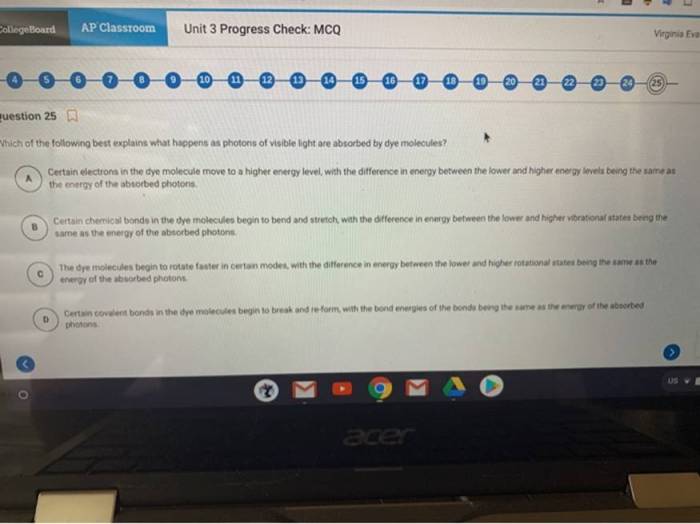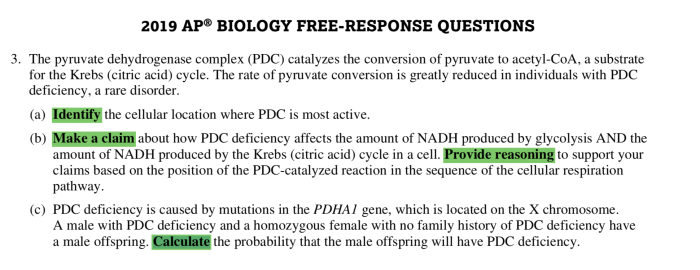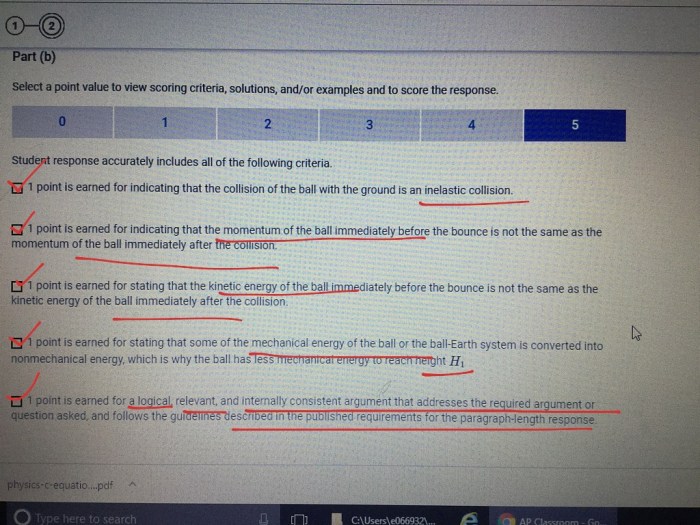Ap bio unit 3 progress check – Embark on a journey through AP Bio Unit 3 with our comprehensive progress check. Dive into the intricacies of cellular respiration, photosynthesis, cell communication, and the cell cycle. Prepare to conquer the upcoming challenges and elevate your understanding of biology.
Our progress check questions will challenge your grasp of these fundamental concepts, ensuring you identify areas for improvement and refine your study strategies. Get ready to unlock your full potential in AP Bio Unit 3.
Concepts Covered in AP Bio Unit 3: Ap Bio Unit 3 Progress Check

Unit 3 of AP Biology explores fundamental processes that occur within living organisms, delving into the intricate mechanisms that govern cellular function and communication.
Cellular Respiration
Cellular respiration is a vital process that generates energy for cells. It involves the breakdown of glucose, releasing energy in the form of ATP. This process is essential for maintaining cellular homeostasis and powering cellular activities.
Photosynthesis
Photosynthesis is the process by which plants and other organisms convert light energy into chemical energy stored in glucose. This process not only provides sustenance for organisms but also plays a crucial role in the global carbon cycle and the production of oxygen in the atmosphere.
Cell Communication
Cell communication involves the exchange of signals between cells, allowing them to coordinate activities and respond to their environment. This process includes various mechanisms, such as signaling molecules, receptors, and signal transduction pathways.
Cell Cycle
The cell cycle encompasses the series of events that occur in a cell, leading to its growth, division, and potential differentiation. Understanding the cell cycle is crucial for comprehending cell proliferation, development, and the regulation of cell division.
Progress Check Questions

Progress check questions in AP Bio Unit 3 evaluate students’ comprehension of the fundamental principles and concepts covered in the unit. These questions are designed to assess students’ ability to apply their knowledge to real-world scenarios and demonstrate their understanding of the interconnectedness of biological systems.
Cell Communication
Progress check questions on cell communication may include the following:
- Describe the different types of cell signaling and provide examples of each.
- Explain the role of receptors in cell communication and discuss the different types of receptors.
- Discuss the mechanisms by which cells respond to signals, including signal transduction pathways.
Cell Cycle
Progress check questions on the cell cycle may include the following:
- Describe the stages of the cell cycle and the key events that occur during each stage.
- Explain the role of cell cycle checkpoints in regulating cell division.
- Discuss the factors that can disrupt the cell cycle and lead to uncontrolled cell division.
Meiosis
Progress check questions on meiosis may include the following:
- Describe the key differences between mitosis and meiosis.
- Explain the process of chromosome pairing and recombination during meiosis.
- Discuss the genetic consequences of meiosis, including the production of gametes with unique genetic combinations.
Mendelian Genetics
Progress check questions on Mendelian genetics may include the following:
- Explain Mendel’s laws of inheritance and how they predict the inheritance of traits.
- Discuss the concepts of dominance, recessiveness, and incomplete dominance.
- Solve genetic problems using Punnett squares and pedigree analysis.
Molecular Genetics
Progress check questions on molecular genetics may include the following:
- Describe the structure and function of DNA and RNA.
- Explain the processes of DNA replication, transcription, and translation.
- Discuss the role of mutations in genetic variation and evolution.
Evolution
Progress check questions on evolution may include the following:
- Explain the theory of evolution by natural selection and provide examples.
- Discuss the mechanisms of evolution, including mutation, genetic drift, and gene flow.
- Explain the evidence for evolution from various sources, such as fossil records and comparative anatomy.
Study Strategies for Progress Check

Preparing for the progress check requires a comprehensive study plan. To maximize your performance, employ effective study techniques that enhance your understanding and retention of the material.
I’m brushing up for my AP Bio Unit 3 progress check and came across a question on free fall. I remembered we did a Gizmo lab on that topic, so I searched for “gizmo free fall lab answers” and found this helpful resource . Now I feel confident that I’ll ace that progress check question!
Start by thoroughly reviewing the course materials, including lecture notes, textbooks, and any additional resources. Organize your notes into logical sections, highlighting key concepts and relationships. This will help you grasp the overall structure and flow of the subject matter.
Practice and Application, Ap bio unit 3 progress check
Regular practice is crucial for success. Engage in active recall by testing your understanding through practice questions, flashcards, or by explaining concepts to a study partner. This forces your brain to retrieve information, strengthening your memory and comprehension.
Time Management and Test-Taking Skills
Time management is essential during the progress check. Familiarize yourself with the test format and allocate time wisely for each section. Develop strategies for answering different types of questions, such as multiple-choice, short answer, and essay questions. Remember, the progress check is not merely a test of knowledge but also a test of your ability to apply that knowledge under time constraints.
Resources for Review

To enhance your preparation for the AP Bio Unit 3 Progress Check, consider utilizing the following resources:
These resources provide comprehensive coverage of the unit’s concepts, offering diverse learning experiences to cater to various learning styles.
Textbooks
- Campbell Biology:A comprehensive textbook covering the full range of AP Bio topics, including Unit 3’s cell communication and cell cycle.
- Biology: A Global Approach:Another detailed textbook that provides a global perspective on biological concepts, including cell signaling and cell division.
Online Resources
- Khan Academy:Offers free video lectures, practice exercises, and articles on cell communication, cell cycle, and related topics.
- AP Central:The official website of the College Board, providing access to practice questions, sample tests, and other study materials.
- Bozeman Science:A YouTube channel with engaging and informative videos on various AP Bio topics, including cell signaling and cell division.
Videos
- Crash Course Biology:A series of animated videos that provide a concise and engaging overview of cell communication and cell cycle.
- Amoeba Sisters:Animated videos that explain complex biological concepts in a fun and approachable manner, covering topics like cell signaling and mitosis.
Practice Tests
- AP Bio Progress Check Practice Test:A full-length practice test available on the College Board website.
- Varsity Tutors:Provides free practice questions and full-length practice tests for AP Bio, including questions on cell communication and cell cycle.
Importance of Progress Check

The progress check in AP Bio Unit 3 serves as a crucial diagnostic tool for students, enabling them to gauge their understanding of the unit’s complex concepts. By taking this assessment, students can identify areas where they excel and pinpoint topics that require further attention.
The results of the progress check provide valuable insights that empower students to make informed adjustments to their study plans. They can prioritize their efforts, focusing on strengthening areas of weakness while solidifying their grasp of topics they have already mastered.
This targeted approach optimizes their study time, ensuring that they allocate their resources effectively.
Tips for Using Progress Check Results
- Review the results carefully:Identify the areas where you performed well and the areas where you struggled.
- Create a personalized study plan:Based on your results, tailor a study plan that addresses your specific areas of weakness.
- Seek support when needed:Don’t hesitate to reach out to your teacher or a tutor for assistance with challenging concepts.
- Retake the progress check:Once you have addressed your areas of weakness, retake the progress check to assess your progress and identify any remaining gaps in your understanding.
Essential FAQs
What is the purpose of the AP Bio Unit 3 progress check?
The progress check helps students assess their understanding of the concepts covered in Unit 3, identify areas for improvement, and adjust their study strategies accordingly.
How can I prepare for the progress check?
Review the course material thoroughly, practice answering sample questions, and seek clarification on any concepts you struggle with.
What resources are available to help me study for the progress check?
Textbooks, online resources, videos, and practice tests can provide valuable support in your preparation.
